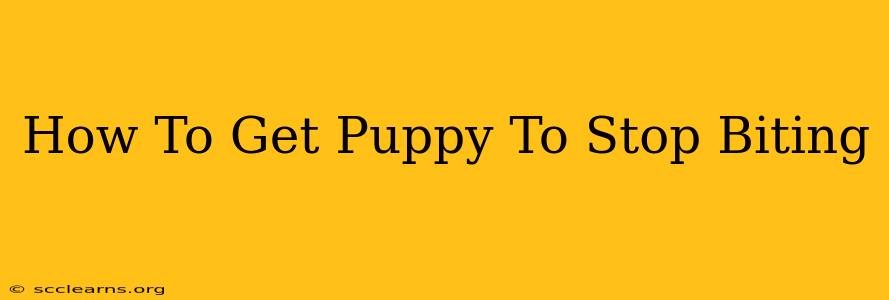Bringing a new puppy home is incredibly exciting, but those sharp little teeth can quickly turn that excitement into frustration. Puppy biting is a common problem, but it's a behavior that can – and should – be addressed. This comprehensive guide will provide you with effective strategies to curb your puppy's biting and build a positive, harmonious relationship.
Understanding Puppy Biting
Before diving into solutions, it's crucial to understand why puppies bite. It's rarely out of aggression; instead, it's usually due to one or more of the following reasons:
- Teething: Puppies' gums itch and hurt as their adult teeth come in, leading them to bite to relieve discomfort.
- Exploration: Puppies explore the world through their mouths. Biting is a natural way for them to learn about textures, tastes, and sensations.
- Play: During play, puppies often get overly excited and resort to biting as part of their playful interactions.
- Attention-seeking: Sometimes, biting is a way for a puppy to get your attention, even if it's negative attention.
Effective Strategies to Stop Puppy Biting
Here's a breakdown of proven methods to help your puppy understand that biting is unacceptable:
1. Positive Reinforcement Training: Reward Good Behavior
This is the cornerstone of effective puppy training. Instead of focusing solely on punishing biting, actively reward your puppy when they don't bite.
- High-value treats: Keep small, delicious treats readily available. The moment your puppy exhibits calm behavior (e.g., licking, chewing on a toy), immediately reward them with a treat and praise.
- Consistency is Key: Be consistent in rewarding good behavior. This reinforces the desired actions and helps your puppy learn what's expected.
2. Redirection: Offer Acceptable Alternatives
When your puppy starts biting, immediately redirect their attention to an appropriate chew toy.
- Keep toys handy: Have a variety of appealing chew toys strategically placed around your home. This makes it easy to offer a substitute when biting occurs.
- Make toys exciting: Make the toys exciting by playing with them alongside your puppy.
3. The "Ouch!" Method: Teaching Bite Inhibition
When your puppy bites, sharply say "Ouch!" in a high-pitched tone. Then, immediately ignore them for a few seconds. This mimics the reaction of another puppy when bitten too hard, teaching bite inhibition.
- Consistency is critical: Every time your puppy bites, even gently, use the "Ouch!" method consistently.
- Avoid physical punishment: Never hit or punish your puppy physically. This can create fear and damage your relationship.
4. Supervise Your Puppy Constantly: Prevention is Key
Young puppies need constant supervision, especially during their teething phase. This helps prevent biting incidents before they happen.
- Crate training: Using a crate provides a safe space for your puppy when you can't supervise them directly.
- Controlled playtime: Keep playtime sessions short and supervised to prevent overstimulation.
5. Tire Your Puppy Out: A Tired Puppy is a Less Biting Puppy
A physically and mentally tired puppy is less likely to bite.
- Regular exercise: Ensure your puppy gets plenty of exercise through walks, playtime, and interactive games.
- Puzzle toys: Use puzzle toys to stimulate their mind and prevent boredom.
6. Professional Help: Seeking Guidance When Needed
If you're struggling to manage your puppy's biting, don't hesitate to seek professional help. A certified dog trainer or veterinary behaviorist can provide tailored guidance and support.
Long-Term Strategies for Success
Remember, consistency and patience are vital. It takes time and effort to train a puppy, and there will be setbacks. Celebrate small victories and stay positive. With consistent application of these strategies, you'll be well on your way to enjoying a happy, bite-free relationship with your furry friend. Remember to focus on building a strong bond based on trust and positive reinforcement. This approach creates a positive training environment and helps your puppy learn and thrive.

